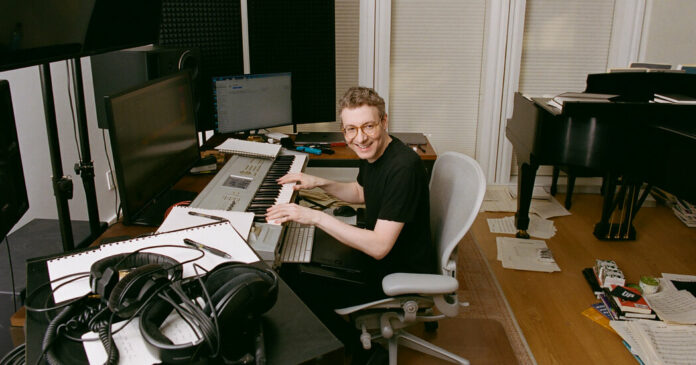There comes a moment near the start of most “Succession” episodes when a faint beat enters the scene, right before some punchline or turn of the screw.
Then the show’s theme music kicks in. Over snippets of vintage family videos, a piano fantasia as grainy as the footage unfurls like a sample for swaggering hip-hop alongside courtly, imperious strings.
Like any effective theme, it lodges itself in your head immediately. But this music’s composer, Nicholas Britell, isn’t a mere tunesmith, and he doesn’t stop there. Over the four seasons of “Succession,” which ends on Sunday, he has written something unusual in television: a sprawling yet conceptually focused score that has developed, episode by episode, into a classic theme-and-variations work that would be just as fit for the concert hall as for the small screen.
This is characteristic of Britell, who doesn’t tend to simply set the emotional tenor of a scene. A screen composer at the forefront of his generation — not a successor to John Williams and his symphonic grandeur but rather a chameleonic, sensitive creator of distinct sound worlds — Britell draws as freely from late Beethoven as he does from DJ Screw, and is compelling in modes of aching sincerity and high satire alike.
And in “Succession,” he evokes a classical music tradition in which a composer doodles at the piano to improvise on a theme, putting it through permutations based on mood and form. This could serve as good parlor entertainment, but also the basis for inventive, kaleidoscopic works; Britell’s soundtrack, in its pairing of piano and orchestra, has an ancestor in Rachmaninoff’s concerto-like “Rhapsody on a Theme of Paganini.” He would do well to adapt his score into a similar piece.
With his theme and variations, Britell offers a parallel of the show itself: an idée fixe established at the start — a patriarch’s departure from the top of his business empire is more of a when than an if — and a circular (some would say static) plot about the ways in which three of his children maneuver to take over.
It is a premise that carries on even after the father’s death early this season; the most recent episode, about his funeral, demonstrates the psychological hold Logan Roy still has over his children and how, united in grief, they nevertheless continue to scheme.
The musical seed for all this couldn’t be simpler: not the theme for the main titles, but a lumbering, eight-chord motif that appears within it, and at the start of the “Strings Con Fuoco” cue.
From there, variations surface with nods to Classical and Baroque forms: a dancerly minuet or rondo, a concerto grosso of angular strings, a wandering ricercare.
Many cues have titles resembling those of a symphony’s movements, tempo indications like “Adagio” and “Andante Con Moto.” Others could blend in with a chamber music program, like Serenade in E flat, or Impromptu No. 1 in C minor, which shares its name with one of Schubert’s most famous piano solos.
That can’t be a coincidence. Listening to Mozart’s Fantasia in C minor (K. 475), “Succession” fans might feel transported to the show’s soundtrack.
In the first two seasons, Britell followed a fairly confined playbook of the eight-chord motif’s different guises: a beating piano similar to that Mozart fantasia, darkly regal strings and brasses.
Generally, each variation was recognizably developed from the same cell. The biggest departures occurred whenever the Roy family left New York. For an episode at Connor’s New Mexico estate, Austerlitz, Britell interjected a guitar variation not heard before or since.
Scenes in England took on a stately fanfare. And, at the family’s country house, preparations for a meal were accompanied by a Schubertian violin sextet.
Something changed by Season 3. The music, like the story, became more openly emotional; for every cunning rondo, there was a doleful largo. Unsteady ground onscreen translated to surprises in the sound, such as Britell’s first use of a choir at the end of the season finale. Again the score swerved, stylistically, when characters were away from Manhattan. During the climactic episodes, set in Tuscany, he put his theme through an Italian prism for cues like “Serenata — ‘Il Viaggio.’”
In the final season, Britell has expanded his palette of variations even further. Logan Roy’s authoritarian monologue on the floor of his news channel ATN is given a coda of chilling dissonance. Suspended chords conjure the in-between state of the children after his death. The irrepressible feelings at the most recent episode’s funeral might as well have a cue title like “Appassionata.”
The question is, how will Britell’s theme and variations end? Historically, composers have gone one of two ways: by revisiting the beginning, as in the Aria of Bach’s “Goldberg” Variations, or with the potential for further development, as in Beethoven’s “Diabelli” Variations.
You could ask the same of the Roy children, who going into the series finale are behaviorally similar to where they started but also, on a deeper level, are not. Will they achieve resolution? Or will their cycles of intrigue continue? Chances are, the answer will be in Britell’s music.


